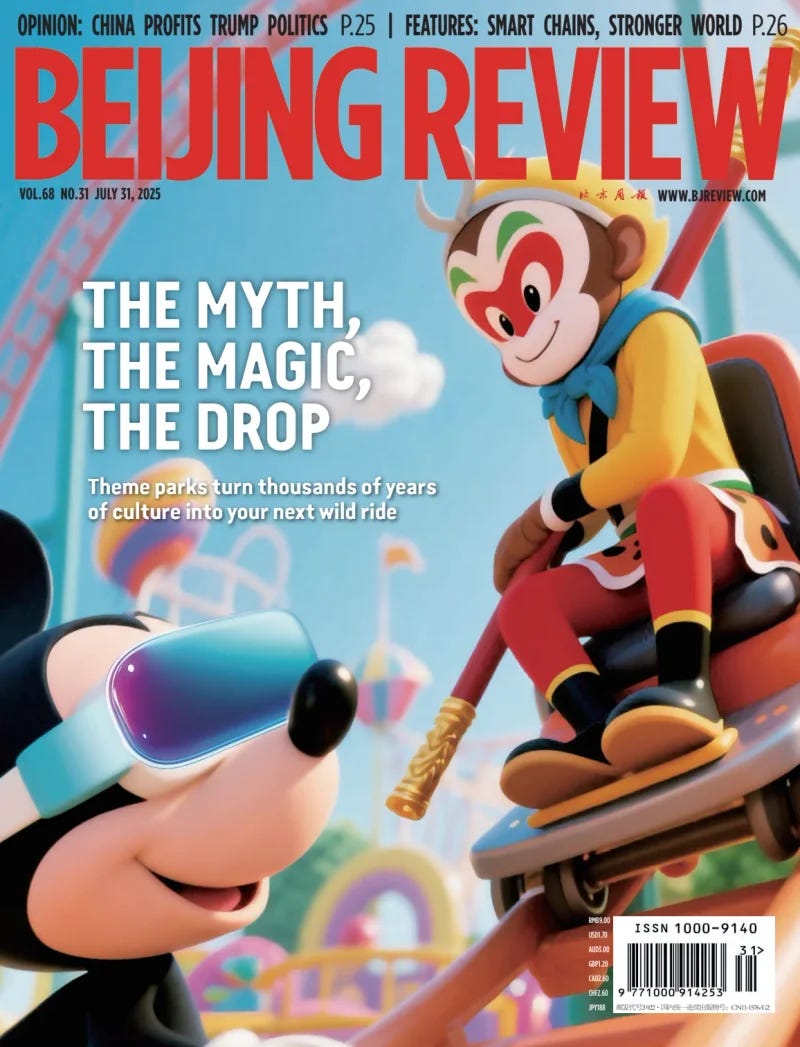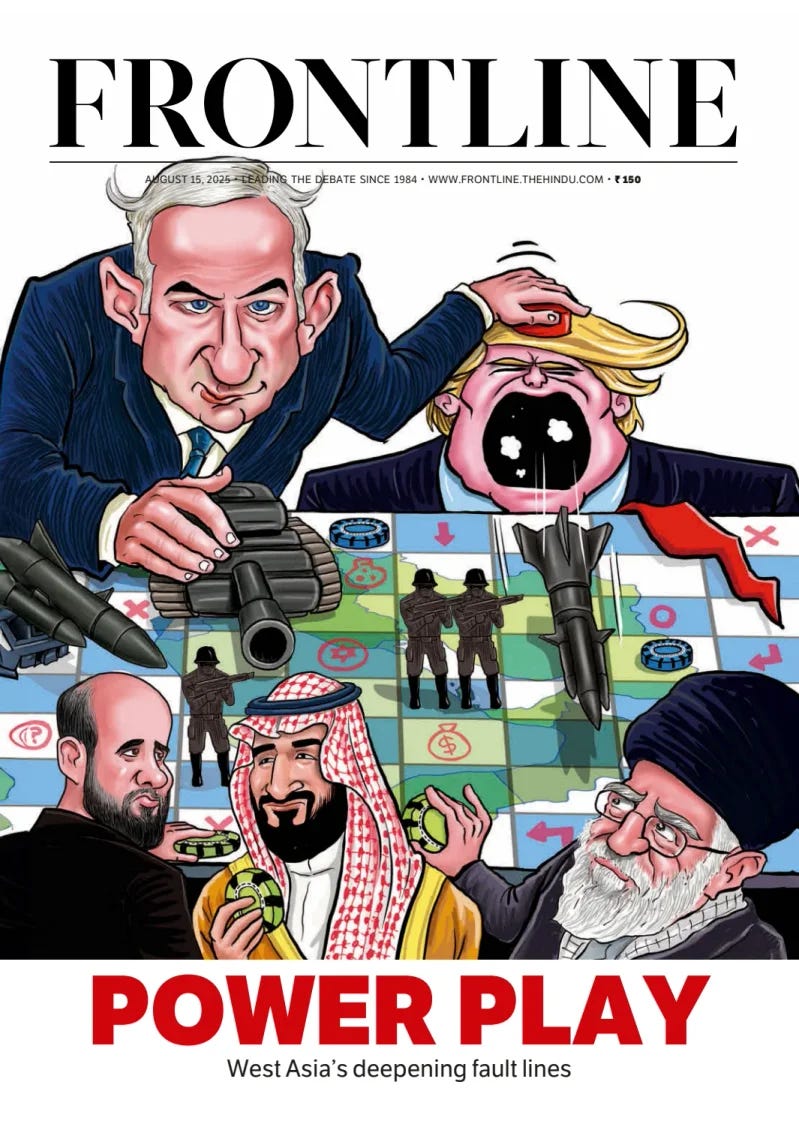Trump Fires Truth-Teller: A White House Drifting Towards Kremlin-Style Rule
From sacking the nation's top job statistician to crushing dissent and reshaping Congress into a loyalist arm, Trump's latest moves erode checks and balances - and global confidence in U.S. leadership
When President Trump didn’t like the weak jobs numbers that were released on Friday, he fired the person responsible for producing them. It was a move with few precedents in the century-long history of economic statistics in the United States. And for good reason: When political leaders meddle in government data, it rarely ends well. But economists and other experts said that Mr. Trump’s decision on Friday to fire Erika McEntarfer, the Senate-confirmed head of the Bureau of Labor Statistics, was a troubling step in that direction. Janet L. Yellen, the former Treasury secretary and chair of the Federal Reserve, said the firing was not what is expected from the most advanced economy in the world. “This is the kind of thing you would only expect to see in a banana republic,” Ms. Yellen said. The Bureau of Labor Statistics is officially part of the Labor Department, whose secretary is a member of the president’s cabinet. But the agency operates independently, producing detailed, nonpartisan data on employment, prices, wages and other topics. Economists say that reliable, independently produced statistics are critical to good decision making in both the public and private sector. Officials at the Federal Reserve rely on government-collected data on inflation and unemployment to decide how to set interest rates, which affect how much Americans must pay to get a mortgage or a car loan. “Good data helps not just the Fed, it helps the government, but it also helps the private sector,” Jerome H. Powell, the Fed chair, said at a recent news conference. “The United States has been a leader in that for 100 years,” he added, “and we really need to continue that in my view.” Experts on government statistics say data from the Bureau of Labor Statistics and other agencies is unlikely to deteriorate dramatically overnight. The acting commissioner named to replace Dr. McEntarfer on a temporary basis, William J. Wiatrowski, is a longtime employee of the agency who is widely respected by experts inside and outside government. The career employees who collect and analyze the data remain in place, using the same methods and procedures they used before Dr. McEntarfer was pushed out. But experts who just days ago were defending the integrity of the statistical agencies now find themselves asking uncomfortable questions about the trajectory of economic data in the United States. “If the poverty numbers come in and look great, is the director of the Census going to get a raise?” said Amy O’Hara, a former Census Bureau official who is now a professor at Georgetown University. “If the household income numbers don’t look great what happens then? What about G.D.P.? What about C.P.I.?” - NYT
World Briefing Hot Take: Trump’s Kremlin-Style Power Grab
The firing of Erika McEntarfer, the Senate-confirmed head of the Bureau of Labor Statistics, is yet another chilling sign that Donald Trump’s White House is morphing into something resembling a Kremlin playbook. McEntarfer’s only “crime” was releasing job numbers Trump didn’t like—a move a former Fed Chair said belongs in a banana republic, not Washington.
This is part of a broader pattern: relentless attacks on journalists as “fake news,” moves to bend Congress into a White House staffing arm, and attempts to suppress courts and opponents. Add to that his erratic treatment of allies like Canada and efforts to massage economic data to make the administration look good—and you have a recipe for deep instability.
It’s not just bad politics. It’s bad for U.S. credibility, for global markets, and for anyone who values checks and balances. The question isn’t whether Trump is unfit for office—it’s how much further down this authoritarian path the country is willing to go.
A Ukrainian MP and other officials have been arrested after the country's anti-corruption agencies uncovered what they call a large-scale bribery scheme in the purchase of drones and electronic warfare systems. In a statement on X, President Volodymyr Zelensky said a Ukrainian MP, heads of district and city administrations and several National Guard service members had been exposed for their involvement, which involved state contracts with suppliers being signed at prices inflated by up to 30%. Zelensky wrote that there can be "zero tolerance" for corruption in Ukraine, and thanked the agencies for their work. The independence of Ukraine's anti-corruption agencies was restored on Thursday, following nationwide protests - BBC
Russian authorities in the Black Sea resort city of Sochi said Ukrainian drones had set a regional oil depot on fire early on August 3, with more than 120 firefighters said to be battling to control the flames. Sochi Mayor Andrei Proshunin said there were no victims. Russian authorities said the recent drone attack on the Sochi oil refinery was one of several launched by Ukraine over the weekend, targeting energy and military installations in the southern Russian cities of Ryazan, Penza, and Voronezh - RFE/RL
Moscow's assault on Ukraine continued overnight. In the southern city of Mykolaiv, the State Emergency Services said at least seven people were injured following a Russian missile strike on a residential area. While authorities in the Kharkiv region said some eleven people were wounded in a strike in the city, Ukraine's second largest. The attacks followed those of Saturday that left at least seven people dead and over 20 injured in Donetsk and Kherson oblasts. The reciprocal attacks also come in what has been the deadliest week in Ukraine in recent months, after Russian drone attacks killed two people in Kherson on Saturday morning and a missile attack on Thursday killed 31 people - Euronews
Shaken by an increasing number of Russian drone attacks, residents of Kostyantynivka in Ukraine's Donetsk region are fleeing their homes as fighting in the area intensifies, RFE/RL reports. Once home to more than 60,000 people, Kostyantynivka has long been a key Ukrainian strongholds in the war-torn Donetsk region. Now, with around 8,200 residents remaining, the strategic city is under constant threat from Russian drones, which locals say often chase them, pounding their long-standing homes. Attempting to encircle both Kostyantynivka and Pokrovsk, Russian forces have tried to seize key roads leading deeper into the Donetsk region and open a route toward the Dnipropetrovsk region. Despite claims by Russian military officials, ground assaults have failed to yield any strategic gains in the summer offensive. However, combined with drone strikes and guided bombs, Russia appears to be achieving at least one of its objectives: depopulating the area, leaving its troops with a clearer path through largely abandoned towns with reduced civilian resistance.
Six more Palestinians have died of forced starvation and malnutrition in besieged Gaza, the Health Ministry says, bringing the total number to 175 people, including 93 children. Meanwhile, the International Committee of the Red Cross (ICRC) has shared its condolences with the family, colleagues and friends of staff member Omar Mansour Isleem, who was killed in an overnight attack on Khan Younis, which also wounded two others. In a post on X, the ICRC said Isleem and his colleagues were on duty in a “clearly marked Palestine Red Crescent Society (PRCS) building…It is unacceptable that first responders in Gaza – like Omar and staff and volunteers of the PRCS – go to work every day fearing they may not return to their families,” the organisation said. “It is an outrage that so many staff and volunteers of the PRCS and other first responders have been killed and injured in the last 21 months of the conflict,” the ICRC said, adding that humanitarian personnel “must never be attacked” - Al Jazeera
Russia is turning towards Africa to grow its civil aviation fleet, which has been severely constrained by western sanctions. Specifically, the country is eying Ethiopian Airlines, the continent's leading airline in terms of fleet size and passengers carried. In a recent meeting with the Ethiopian Civil Aviation Authority (ECAA), Russian officials proposed a tit-for-tat trade deal, supposedly benefitting both parties. This included a possible wet-lease agreement for modern planes. Russia is growing its presence in Africa, characterizing both an interest in the region's economic growth and geopolitical ambitions for more influence. Possible collaboration with Ethiopia could be seen as a move to help solidify the country's position as a global power. China and Russia have expanded their reach across Africa through trade deals and other economic agreements. Russia's bilateral trade with Ethiopia, for instance, is said to have increased by nearly 40% year-on-year during the first 10 months of 2024. By turning to Africa for its own aviation industry, Russia hopes to take full advantage of its political influence. Ethiopian Airlines is one of the continent's fastest-growing carriers and boasts a very modern fleet of Western-made jets. Plenty to offer, therefore, should the two parties reach an agreement to support Russia's growing aviation needs - Simply Flying
This year the world’s biggest art fair announced a new host city to its roster for high net worth collectors and prestigious galleries: Doha. The move is the latest symbol of something that has a long history ― top-end art meshing with big money. That raises important questions about where culture stops and business and politics begin. Qatar’s capital joins a short list of cities that put on fairs belonging to Art Basel, a franchise that has become a behemoth in contemporary art, and which includes Paris, Hong Kong, Miami, and Basel in Switzerland, from where it takes its name. At first glance, the Gulf State isn’t an obvious choice for an art mega-fair. The contemporary art scene evolved out of the ateliers of Paris and New York, and for a long time the art market remained, with some important exceptions, a largely Euro-American affair. That’s changed, and Asia, Latin America, and the Middle East have become increasingly important markets for collectors. Sheikha Al Mayassa bint Hamad bin Khalifa Al Thani, the sister of the current emir, put Qatar on the art world map. She manages the country’s museum network which at one point was spending a reported $1 billion a year to amass a collection of works that includes a $250 million painting of card players by Cézanne, and a $300 million Gauguin. It paid off — with the Gulf State set to host a new edition of the prestigious fair in February. It’s just the latest coup for Qatar, uncomfortably wedged between Saudi Arabia and, across the Persian Gulf, Iran, as it expands its soft power by hosting global events and securing the friendship of the rich and powerful through investment and entertainment. Clinching the 2022 FIFA World Cup was its single biggest win. But Doha’s push to win friends and influence people has a dark side. The World Cup bid exposed the country to accusations of bribery and labor rights violations. Activists said that as many as 6,500 workers died building the stadiums in extreme conditions. The official numbers are lower, but are still high, at between 400 and 500 deaths. More recently, the country made headlines in Brussels with a corruption scandal that bears its name, and which involved the arrest of two EU lawmakers as well as a number of their associates.
Residents of Montmartre in Paris are raising alarms over escalating overtourism, fearing their neighbourhood could become like Barcelona or Venice. Locals report that the historic area now resembles a theme park, with essential food shops being replaced by souvenir and snack stalls. The Vivre à Montmartre association has proposed measures such as limiting tour groups to 25 people, banning loudspeakers, and increasing the tourist tax. Concerns also include rising real estate prices, up 19 per cent in a decade, with the mayor of the 18th arrondissement advocating for stricter controls on short-term rental platforms like Airbnb. Paris tourism reached 48.7 million visitors in 2024, with Montmartre receiving around 11 million annually, and a further 20 per cent rise in bookings is anticipated for 2025 - Independent
A 'secret' paradise beach in Mallorca has become a crowded hotspot after influencers promoted it online. Caló des Moro, once a secluded cove, turned into a tourist-choked destination after Instagrammers posted striking shots of its crystal clear waters and beautiful scenery. Last summer, tourism officials encouraged content creators to visit lesser-known areas like Caló des Moro in a bid to ease pressure on busier island hotspots. But, the strategy backfired, with viral posts luring swarms of holidaymakers to the once remote beach. Footage shows sunseekers queueing just to access the sand, while piles of rubbish now litter the once-pristine shoreline. In some clips, the beach is so packed that the ground is barely visible. Many are blaming influencers for ruining Caló des Moro. More than 1,300 TikToks about the beach have been posted, racking up an estimated 10 million views. Meanwhile, Instagram currently has 30 associated hashtags. Mayor Maria Pons last year revealed that up to 4,000 people and 1,200 vehicles were descending on the cove every day. In response, local authorities removed all pictures promoting Calo des Moro from its official website. Frustrated locals voiced their outrage, with hundreds of campaigners storming the stunning spot and vowing to 'reclaim' it from holidaymakers. More than 300 protesters descended on the cove last June as they unfurled a huge banner stretching across the beach which read: 'Let's occupy out beaches.' Others stayed in a nearby car park and distributed leaflets in English and German informing tourists about the mobilisation - forcing tourists to turn back and leave the cove. Footage from the demonstration shows a woman sitting across a path leading down to the popular Caló des Moro while a local shouted at would-be tourists to 'go, go, go!' - Daily Mail
Thailand's tourism industry along the Cambodia border is teetering on the brink of financial ruin as escalating tensions have triggered booking cancellations of 80-100% across affected provinces, according to official government assessments. The Tourism Authority of Thailand (TAT) has released a comprehensive impact analysis covering the period from 25-28 July, revealing the devastating effect of border hostilities that began escalating in early May on the country's vital tourism sector. TAT Governor Thapanee Kiatphaibool described the psychological toll on travellers, stating that border tensions have created deep uncertainty amongst tourists who are now avoiding or cancelling planned trips to affected regions entirely. The eastern province of Sa Kaeo has experienced the most severe impact, with 100% cancellation or postponement rates in Aranyaprathet district, which borders Cambodia directly. Even Sa Kaeo's inland areas have seen 80% of bookings cancelled or deferred. Neighbouring Chanthaburi province has recorded 80% cancellation rates across its tourist destinations, whilst Trat province has seen complete cancellations in all border-adjacent areas. The popular island destinations have also suffered significant losses, with Ko Chang experiencing 10-30% cancellations, Ko Mak losing 20-30% of bookings, and Ko Kood facing the steepest decline at 50-60%. - The Nation







